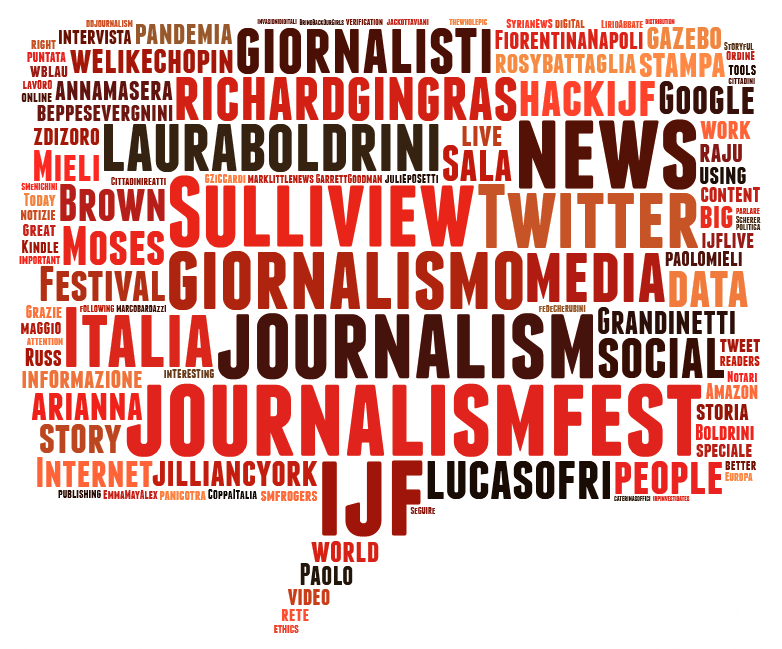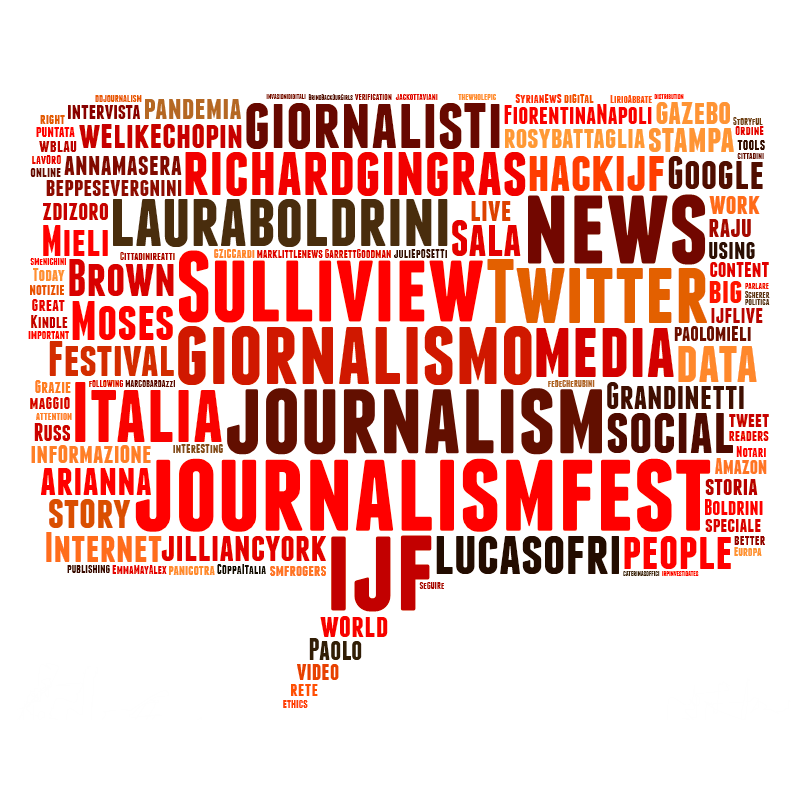The fourth day of the International Journalism Festival showed again an increase in user engagement in web conversations: 3776 users produced 13,286 tweets, half of them as retweets and 8.2% as replies. A peak in conversation on Twitter took place at 12.15 p.m.
An increase in social network interactions, with a significant number of unique users, was a trend for the four festival days. In fact, from the second day of the Festival, the amount of online contributions went up and outnumbered those from 2013.
One of the central issues was the reflection on the profession of a journalist. What does it mean to be a journalist today and what is a journalist’s role in the democratic society? The time of user generated content challenges journalism. Getting information becomes more and more interactive. This blurs the line between those who “publish” and who “consume” information.
Freedom of the press goes hand-in-hand with the lack of a definition for journalism. Anyone can be a journalist. – @richardgingras #IJF14
— Garrett Goodman (@GarrettGoodman) 3 Maggio 2014
Democratisation of content distribution: @om The community defines what news is and the truth will always come out cc @marcoprat #ijf14 — Steffen Konrath (@StKonrath) 3 Maggio 2014
In such context the necessity for journalists to serve a community is crucial.
@rosybattaglia @peppemanzo @MarcoBendinelli @pietrodommarco #ijf14 Noi non ci saremmo se non ci fossero i cittadini
— Ilaria Dioguardi (@IlariaDioguardi) 3 Maggio 2014
.@Sulliview: “The biggest challenge is to hang on the values that really make us what we are, and not to lose them in transition.” #ijf14 — journalism festival (@journalismfest) 3 Maggio 2014
One of the events that attracted interest was a keynote speech of Margaret Sullivan, who mentioned the essential qualities of a journalist. In the world of information overload, where news is diffused in a real-time manner, the value of journalism is conversion from quantity to quality.
“Fast is good but right is better” Se lo dice Margaret Sullivan del @nytimes potete crederle, su. #ijf14
— occhidaorientale (@occhidaoriental) 3 Maggio 2014
Another subject mentioned was the future of journalism. New technologies offer interesting possibilities, but the reality is often hard.
@Sulliview “I’m encouraged by the number of new startups and media. It’s a good and unpredictable time to enter journalism” #ijf14 — Eleonora Degano (@Eleonoraseeing) 3 Maggio 2014
#Freelance, Rapporto @lsdi: “112mila giornalisti iscritti all’ordine, ma solo 48mila percepiscono un reddito” #ijf14 pic.twitter.com/SEoVjZ9nUD
— David.G (@Ghostwriter37) 3 Maggio 2014
From the tag cloud of tweets it can be seen that other events generated major conversation on the Web including talks by Luca Sofri, with Laura Boldrnini, and the keynote speech of Richard Gingras.

Some of the most interesting reflections of Richard Gringras about the future of information ecosystem were shared on the web.
L’ecosistema che mappiamo ha come atomo la Storia che viene condivisa e raccomandata e determina flussi di pubblico @richardgingras #ijf14 — Gio. Boccia Artieri (@gba_mm) 3 Maggio 2014
“In the Internet, everyone can be famous within 15 minutes” – @richardgingras, @google #ijf14 pic.twitter.com/8VUExyAEn5
— journalism festival (@journalismfest) 3 Maggio 2014
All details about Web conversation on the third day of #ijf14 can be found on the platform Buzzdetector:Buzzflow.


